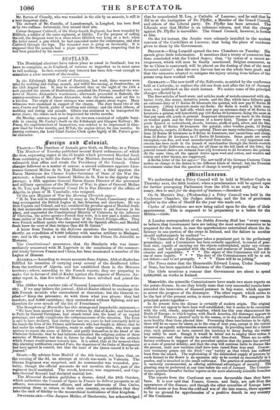SCOTLAND.
The Municipal elections have taken place as usual in Scotland; but we have to complain, as in England, of returns so imperfect as in most cases to tell nothing. In fact, scarcely any interest has been felt—not enough to stimulate a clear account of the results.
In the Edinburgh High Court of Justiciazy, last week, three weavers were tried for mobbing and rioting, assault, and wilful fire-raising, at Dunfermline, on the 13th August last. It may be recollected that on the night of the 13th a mob paraded the streets of Dunfermline, assaulted the Provost, smashed the win- dows of Messrs. Alexander's warehouses; afterwards proceeded to Balmnk, the country-residence of Mr. James Alexander, broke the windows, and set fire to a kitchen. The origin of these outrages was some dispute about wages. Many witnesses were examined in support of the charge. The Jury found two of the men, Contts and Smith, guilty of mobbing and rioting; and the third, Gibson, of mobbing and rioting and assault. Gibson was sentenced to be transported for seven years; the others each to be imprisoned for twelve months.
On Monday, sentence was passed on the two men convicted of culpable homi- tide in causing Mr. Cooley's death on the Edinburgh and Glasgow Railway: Mr. Paton, the superintendent of locomotives, was ordered to be imprisoned in Glas- gow Gaol for twelve months, and M'Nab, the engine-driver, for nine months. In passing sentence, the Lord Chief Justice Clerk spoke highly of Mr. Paton's gene- ral character.


























 Previous page
Previous page